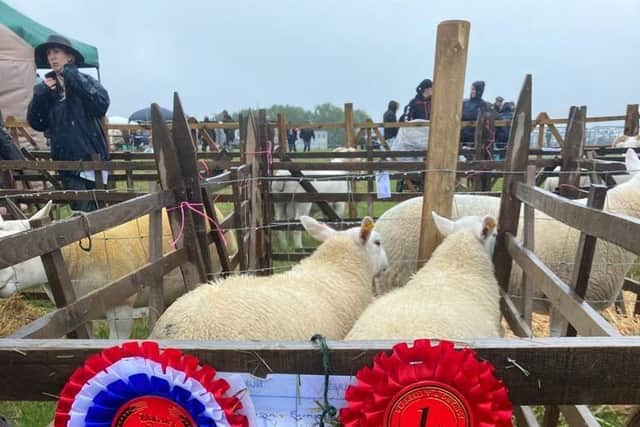Northamptonshire farmer one of just a few southerners to use traditional Scottish hill breed of ram
and live on Freeview channel 276
A Northamptonshure sheep farmer is bringing a taste of the highlands to the East Midlands.
Luke Stimson, who farms at Stoke Bruerne near Towcester, has become one of just a handful of farmers in the south of England to use a North Country Cheviot ram on his ewes.
Advertisement
Hide AdAdvertisement
Hide AdThe North Country Cheviot is a traditional hill breed that hails from the highlands of Scotland and is known for its hardiness and thrift.


It is also known for producing top quality prime lambs that sell well at market, helping farmers to generate more profit from their sheep.
Luke, a first generation farmer, said when he first bought a North Country Cheviot ram to his farm, neighbouring sheep farmers laughed at the animal.
But they were soon laughing on the other side of their faces when lambs sired by the ram swept the boards at a local country show.
Advertisement
Hide AdAdvertisement
Hide AdLuke said: “I was showing butchers lambs – all 46kg and above – at a local show and I came away with champion everything. Champion ewe lamb, champion ram lamb, champion butcher’s lamb. They all came from the Northie, so I thought just let them laugh as I’ll have the last laugh.”
Luke first decided to buy a North Country Cheviot tup after seeing some Scotch Half Bred sheep for sale at a local market. Scotch Half Bred are produced by crossing a North Country Cheviot ewe with a Border Leicester ram and Luke was impressed by their size.
After being ‘unable to stop looking at them’, he travelled to the sheep sales at Kelso and bought a North Country Cheviot ram from the renowned Allanshaws flock to use on his flock of 250 commercial continental ewes.
So impressed was he, the next year he bought 20 North Country Cheviot ewes to start a pure bred line, selling females and rams to private buyers, via the website sellmylivestock.com, and at Bakewell market where Derbyshire hill farmers value the hardiness of his stock.
Advertisement
Hide AdAdvertisement
Hide AdOn the commercial side of this, he sells finished lambs at Rugby auction mart, achieving an average a price of £140 over the past 12 months.
Luke said: “We use continental tups to breed female replacements and Northie tups to produce prime lambs.
“The main thing Northies bring to a cross is thrift and hardiness. Lambs hit the floor and within two hours they never want to see you again.
“They get finished four to six weeks before a continental – we lamb in January and February and they’re away by May/June – plus they finish on fresh air.
Advertisement
Hide AdAdvertisement
Hide Ad“There are a lot of mule men and Suffolk men around here and I can’t understand why they’re not using them as a terminal sire on early lambing flocks as they will stand being outdoors and on grass rather than being intensively farmed indoors. Not only does this make financial sense, it also has environmental and emissions benefits.
“They’re very few Northies in the Midlands, but we’re breaking that mould and starting to change perceptions.”
Luke, who described himself as being obsessed with sheep since he was a schoolboy, first got into farming when his mother bought him six sheep for doing well in his GCSEs.
From humble beginnings, Luke, his wife Beckee and their four children – Isabella, Tristan, Megan and Noah – have had tremendous success in the show ring for their pure bred North Country Cheviots, turning out some of the best sheep to be bred in the south of England.
As well as his pure bred and commercial flocks, he also runs 40 Belgian Blue and Blonde suckler cows.